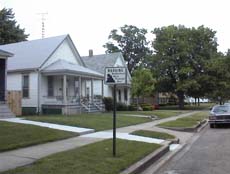|
"The
best people to identify activity that is out of the ordinary in each
neighborhood are those that live there," he said.
Rich
Montcalm, community police officer, who spearheads, among
other duties, the
D.A.R.E., Neighborhood Watch and Citizens' Police Academy programs,
said that various individuals in Lincoln comprise the Neighborhood
Watch.
"They
watch for the kind of activity that is suspicious and help to prevent
it by notifying local law enforcement agencies," he said.
Other
things that people can do is to make sure that areas that might invite
vandals or burglaries be well lit.

"Motion
detectors that activate a lighting system are also good steps to
take," Montcalm said.
Vandalism
in Lincoln runs through cycles, Ludolph said.
"In
the winter, the activity generally slows down because less people are
out walking around. Acts that do occur are harder to solve because
those committing them may be in cars and are more mobile. Houses are
also closed up and it is more difficult to hear anyone," he said.
"This
activity tends to pick up in the summer and also again in the fall
after schools have started," Ludolph said.

Montcalm,
through his efforts with the local schools, also brings up the subject
of vandalism in his presentations for D.A.R.E. and the Halloween
safety programs. Other
than smashed pumpkins, little major vandalism has occurred during
Halloween.
|

Vandalism,
whether it's random and committed out of boredom, or directed at an
individual as "punishment," can come in many different ways.
Tires
may be slashed, windows broken, car paint scratched and spray paint
used," Ludolph said. "It involves all individuals. Juveniles
and young adults from 19 to 22 years of age commit some of the
offenses. It isn't always
a high school kid," he added.

Individuals
interested in helping can do so either through direct participation
with the Neighborhood Watch Group or the Citizensí Police Academy
can contact Montcalm.

Ludolph
and Montcalm both agreed that citizensí involvement on an ongoing
basis is necessary if vandalism is to be thwarted.
"Illegal
activity doesn't occur when the squad car drives by," Ludolph
said. "We patrol all areas, but individuals that see suspicious
activity when we're not around should contact the police," he
added.
Individuals
can also contact "Crime Stoppers" if they have information
that may prevent these acts or to help solve cases that have occurred.
[Fuzz
Werth]
|



